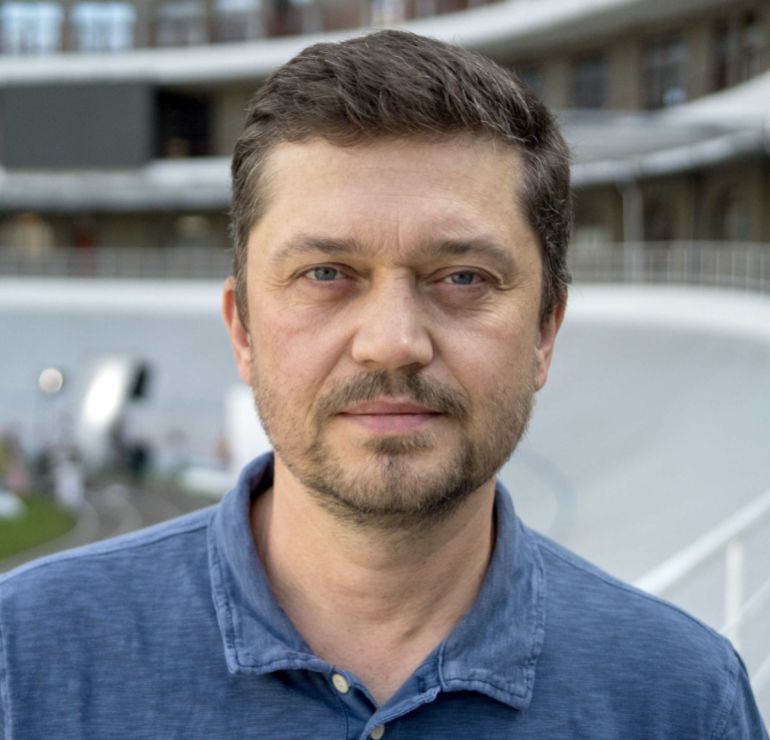As Russian attacks on Ukraine have continued since February 24, a group of Ukrainian filmmakers have released statements about their experiences from the front lines of the war, calling for action to isolate Russia and impose a total cultural boycott on it.
The artists' statements come in the wake of a demand by Ukrainian film director and political activist Oleg Sentsov to sign the petition published online by the Ukrainian Film Academy calling for a boycott of Russian films.
Sentsov - who was imprisoned in Russia for 5 years on terrorism charges - posted a video of himself from the middle of the war, where he joined the front lines as a reserve soldier in the National Guard.
"For a week now I have been standing in the trenches as a participant in the territorial defense of Kyiv. Life changed in an instant with the first bomb falling on the territory of Ukraine, and everything we know about Hitler's invasion is now true again," he said during the video clip.
He added, "Russian bombs fall on Ukrainian children, millions are hiding in shelters, millions suffer from cold and lack of food, and for this, we need the support of intellectuals and artists opposed to the Putin regime, and we ask for your support for a boycott of Russian cinema in all its forms, including film cooperation that includes Co-production and international festivals.
whole district
A group of Ukrainian filmmakers, who remained in their country despite the continuing attacks, added their voice to Sentsov's;
They are the author and director of feature films Marina I. Gorbach, whose most famous works are the drama and war film "Klondike", and Alina Gorlova, the documentary filmmaker, whose most famous works are "This Rain Will Never Stop", and producer Daria Basil.
As well as Valentin Vasyanovich, writer and director of the movie “Atlantis,” Antonio Lukich, writer and director of “My Thoughts are Silent,” Roman Bondarchuk, director of the documentary “Ukrainian Sheriffs,” and director Nariman Aliyev known for his movie Homeward.
Lukich said he had to leave the recordings of his new movie in Kyiv, in order to evacuate his children from the war zone. to a safe place, and now hopefully they will not be destroyed."
"But does this matter now? It's not really important...other things are important now," the Ukrainian director added, stressing that the most important thing the world can do now is "that the international film community supports the complete boycott of Russian films and culture."
propaganda weapons
As for director Aliyev, he also stressed the need to impose a boycott on Russia, saying that Russian artistic and cultural works sponsored by Moscow "have always been a tool used to legitimize all crimes committed by their authorities."
"What the Russian soldiers and bombs do is not different from what their propaganda weapons do, which may not directly kill people, but justify these atrocities," he added, adding that "the boycott of Russian cinema and culture at the moment is an attempt to cleanse the world of the propaganda of a terrorist state."
The group of Ukrainian filmmakers stressed that any measure that does not completely ban Russian works is tacit support for Putin's military attacks on their country.
For his part, director Vasyanovich said, "The fact is that Russia has at all times used its cultural and artistic achievements as a cover for its aggressive actions, and it is necessary to lower the cultural curtain on Russia," and stressed his demand to stop "any cultural cooperation with representatives of a terrorist state that threatens to destroy the whole world."
The Entire staff of the Russian TV channel “the rain” resigned during a live stream with last words: “no war” and then played “swan lake” ballet video (just like they did on all USSR tv channels when it suddenly collapsed) # Ukriane #UkraineRussiaWar #Russia #StandWithUkraine️ pic.twitter.com/o4LzUqnWLc
— Ukraine News UK (@UkraineNewsUK) March 4, 2022
In the same context, Gorlova said, "Until Russia publicly admits the wrongdoing of its actions (in Ukraine), or is condemned under international law, I consider any representation or support for Russian cinema unacceptable."
Linking the current war to what German artists did previously to support the Nazi regime, director Bondarchuk said that the culture supported by the Russian state "created the ideological basis for this war, and after the war ended, these works can be returned to, studied and researched, just like studying the films of Leni Riefenstahl or the works of Leni Riefenstahl. Richard Wagner these days."
He added that the only acceptable way to broadcast Russian works was to show Tchaikovsky's "Swan Lake", which was used during the Soviet era as a signal of political turmoil in the country.
Writer and director Valentin Vasyanovich (social networking sites)
Which is exactly what the workers of the leading Russian independent television station "Dozhd" did on the third of this March, when all the workers announced their resignation from their positions live, after receiving a threat to close the station by the authorities, amid pressure related to its critical coverage. Russian military operations in Ukraine.
They said their last word, "No to War", before playing the monthly "Swan Lake", as happened in August 1991, during the attempted coup that heralded the beginning of the end of the Soviet Union.
And from the Russian people themselves, director Kantemir Balagov tweeted that he left his country Russia in the wake of the war on Ukraine, and wrote, "Our hearts are with Ukraine and the Russian people who are standing against this nightmare."

